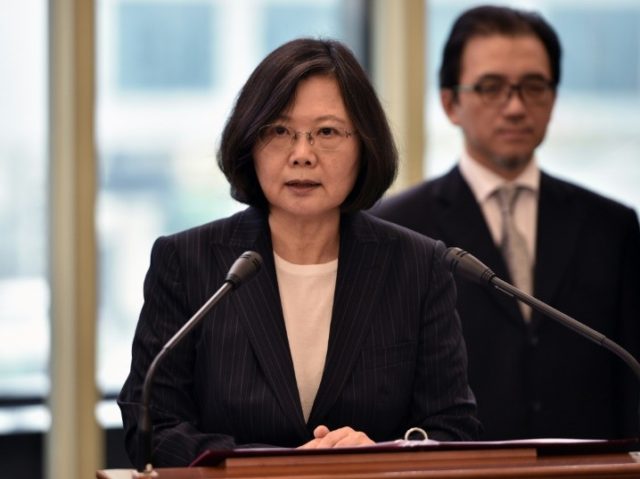Taiwan’s President Tsai Ing-wen asked the world to help Taiwan “constrain China” in an interview with Agence-France Presse (AFP) on Monday, warning that the world’s “democracy, freedom and freedom to do business” were imperiled by the Communist Party.
She repeated these warnings on Tuesday, prompting a stern rebuke from Beijing.
China’s Foreign Ministry, top officials, and state propaganda outlets all decried Tsai’s “ravings” and insisted that she cease promoting the free society that Taiwan has cultivated as an independent state.
China considers Taiwan a rogue province and does not acknowledge its sovereignty. Under Communist Party chief Xi Jinping, Beijing has increasingly threatened military action if Taiwan does not submit to Beijing’s tyranny.
“We need to work together to reaffirm our values of democracy and freedom in order to constrain China and also minimize the expansion of their hegemonic influence,” Tsai told AFP on Monday. “This is not just Taiwan’s challenge, it is a challenge for the region and the world as a whole, because today it’s Taiwan, but tomorrow it may be any other country that will have to face the expansion of China’s influence.”
“Their democracy, freedom and freedom to do business will one day be affected by China,” Tsai added.
On Tuesday, Tsai reaffirmed her message to the world at the Global Solidarity of Democracy in Taiwan forum in Taipei.
“In the 21st century, democracy is in retreat,” Tsai warned, signaling that China is among the world’s most acute threats to free societies, according to the Taipei Times. “Over the past two years, we have faced increasing pressure from China as they threaten our democratic way of life and limit our international space. … Authoritarian regimes are exercising sharp power to take advantage of our free and open societies, promote alternative agendas, control and censor information, and undermine our democracies.”
“Sharp power” is a term used for nonmilitary, indirect means of coercion to ensure that foreign entities submit to the authority of a government. China uses sharp power when it threatens American corporations with having operations in China shut down if their websites use language that Beijing disapproves of or acknowledges the existence of Taiwan or the Dalai Lama. It also uses foreign diplomats and academics to pressure foreign governments to abide by Communist Party ideology or risk diplomatic problems with Beijing.
“It is only if like-minded countries work together — and stand together — that we can fight against unwanted economic, political or military coercion, and defend the values we hold dear,” Tsai asserted on Tuesday.
Under Tsai, Taiwan has become much more vocal in asserting its independence and seeking closer ties to the United States. Noting the friendlier disposition of the Trump administration towards Taiwan, Tsai called then-President-elect Donald Trump to congratulate him on his election victory in 2016, and Trump answered, prompting outrage from the Xi regime. The Trump administration has since signed the Taiwan Travel Act into law, which facilitates Taiwan-U.S. travel by excluding Chinese authorities in the process, and opened a sprawling de-facto embassy on the island.
China has responded with vitriol to Tsai’s warnings this week. The Global Times, a government-produced Chinese newspaper, called her remarks “ravings” and accused her of “political hypocrisy.”
“Tsai is not accepted by any influential international organization and thus is happy to talk to Western media. But this time Tsai has gone too far,” the Global Times declared. “This highlights that the Tsai administration panics following a series of failures. It has no choice but resorting to such provocative remarks to motivate pro-independence forces and win sympathy from the international community.”
“Tsai is taking a dangerous step forward from her previous commitment to maintaining the status quo,” the Times asserted.
Ma Xiao Guang, a spokesman for China’s Taiwan Affairs Office, independently called Tsai’s comments “misleading and totally baseless,” accusing her of “plotting to contain the great rejuvenation of the Chinese race.” It is unclear which race Ma is referring to, as China is home to a wide variety of ethnic groups. The majority ethnic group in China and controlling group in the Communist Party is the Han.
The Chinese Foreign Ministry limited its comments, as they are intended for an international audience. “As we said on many occasions, Taiwan is part of China. What was said by certain person in Taiwan falls within China’s internal affairs, and we won’t give specific reaction to that here at the Foreign Ministry,” spokesman Lu Kang said on Tuesday. “I shall point out in principle that we hope certain people in Taiwan could correctly understand the development trend of China and its national unity.”

COMMENTS
Please let us know if you're having issues with commenting.